Dental Implants – Kansas City, MO
Tooth Replacement That Lasts for Life
No one ever expects to lose a tooth, but it’s more common than you might realize. In fact, 120 million Americans have lost at least one tooth. Thanks to the latest advancements in dentistry, you can replace your missing teeth with a nearly perfect replica of your natural structure. Dr. Michael C. Byars can rebuild your smile with dental implants in Kansas City – the only tooth replacement solution that looks, feels, and functions just like your original pearly whites. Contact our office today to get started!
Why Choose Michael C. Byars, DDS for Dental Implants?
- Entire Dental Implant Process Performed In-House
- 3D Cone Beam Scanner Guarantees Precise Dental Implant Placement
- Dental Insurance Accepted & Flexible Financing Available
What Are Dental Implants?

The reason dental implants are so unique is because they are the only treatment that actually replaces the entire tooth from root to crown. Once the implant (a titanium post) is placed into the jawbone, it actually bonds with the surrounding bone just like a real tooth, and this provides the foundation for a crown, bridge, or denture. These new roots help the replacement teeth look more natural and not put pressure on the nearby teeth and gums like regular bridges and dentures, leading to a more comfortable fit. Additionally, their sturdy foundation in the jaw enables them to potentially last a lifetime, making them a quality investment over alternative solutions.
The 4-Step Dental Implant Process

Replacing your missing teeth with dental implants takes longer than it would with bridges or dentures alone, but their longevity makes them worth the wait! While everyone’s dental implant journey is different, here are the four basic steps you can expect in the dental implant process:
Initial Dental Implant Consultation
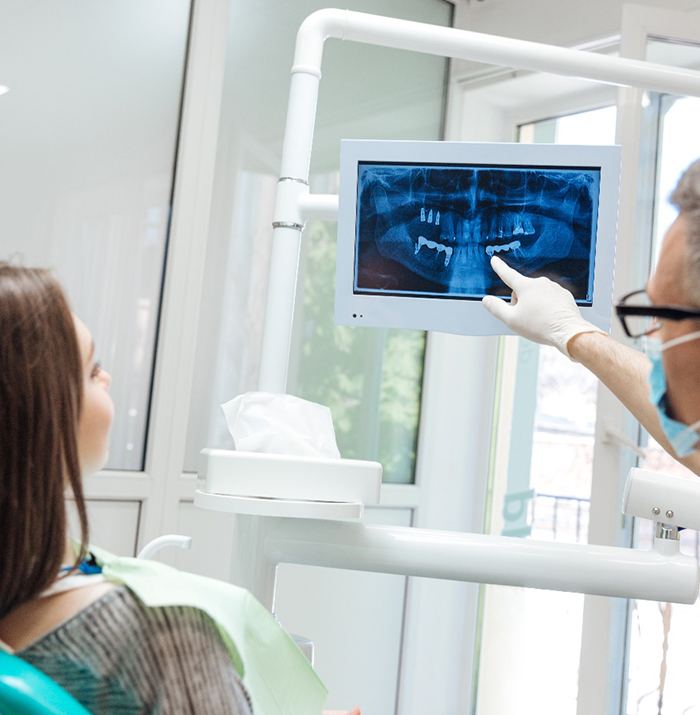
The process begins with a consultation with Dr. Byars, your implant dentist in Kansas City. He’ll thoroughly examine your smile and take detailed x-rays to determine your eligibility for the procedure. If your jawbone is sturdy enough, you can go ahead and schedule the implant placement surgery. If not, you might need to undergo a bone graft or sinus lift to strengthen that area of the bone so that it can accommodate the implant posts.
This appointment is the perfect opportunity to ask any questions you may have about the cost, timeline, or any other aspect of the dental implant process.
Dental Implant Surgery
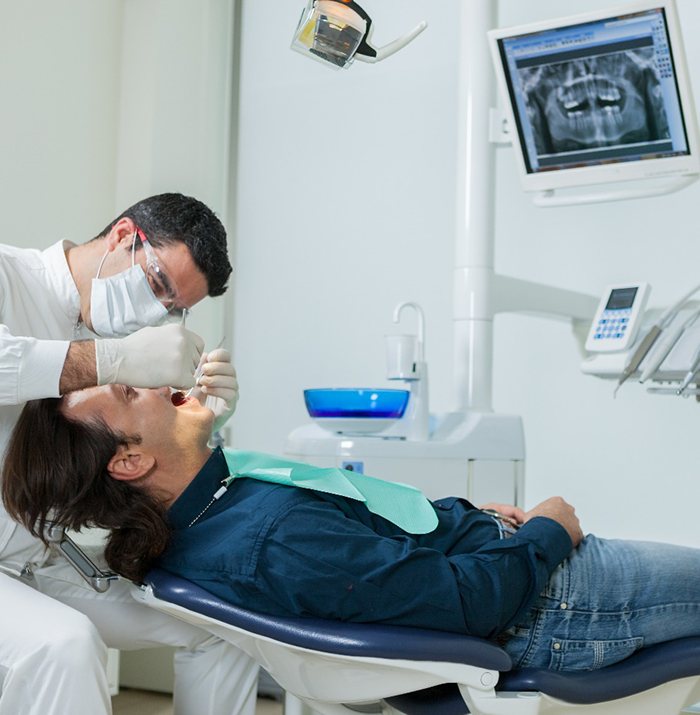
Dr. Byars has undergone advanced training to be able to perform the surgical aspect of the dental implant process himself. This saves you the time, money, and stress of being referred to an outside specialist.
Before the procedure begins, you’ll be given a powerful local anesthetic to numb your mouth and ensure you don’t feel pain. You might even receive sedation to soothe your nerves.
Depending on the number of implants you’re getting, one or more small incisions will be made in your gum tissue to access your jawbone. Each implant is inserted at a precise location and angle. Once the posts have been placed, your gums are sutured closed, and you can begin the healing process.
Dental Implant Osseointegration/Abutment
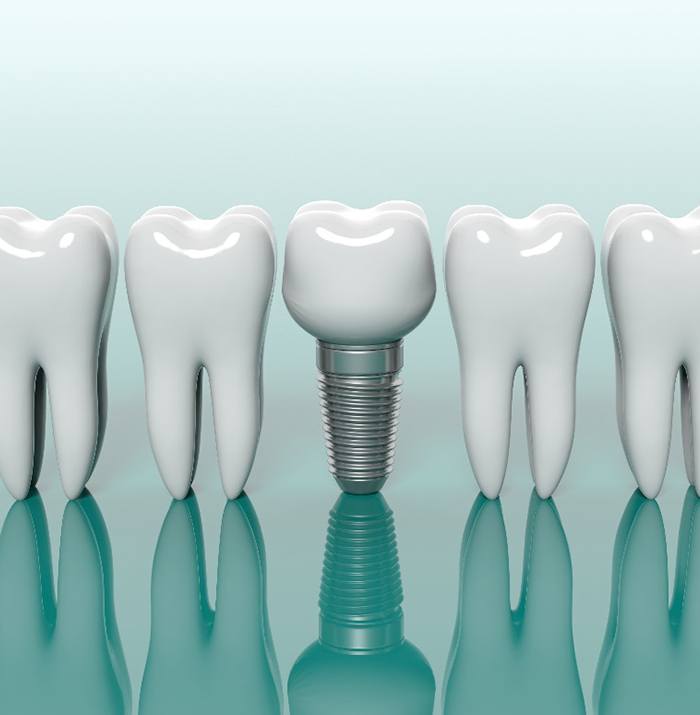
Over the next three to six months, the biocompatible titanium posts will gradually fuse with your jawbone in a process called osseointegration. After you’re finished healing, you’ll undergo a brief, smaller surgery so that your abutments can be placed. Abutments are little metal connectors that allow your restoration to be placed on top of your dental implants in Kansas City.
Delivery of Dental Implant Restorations
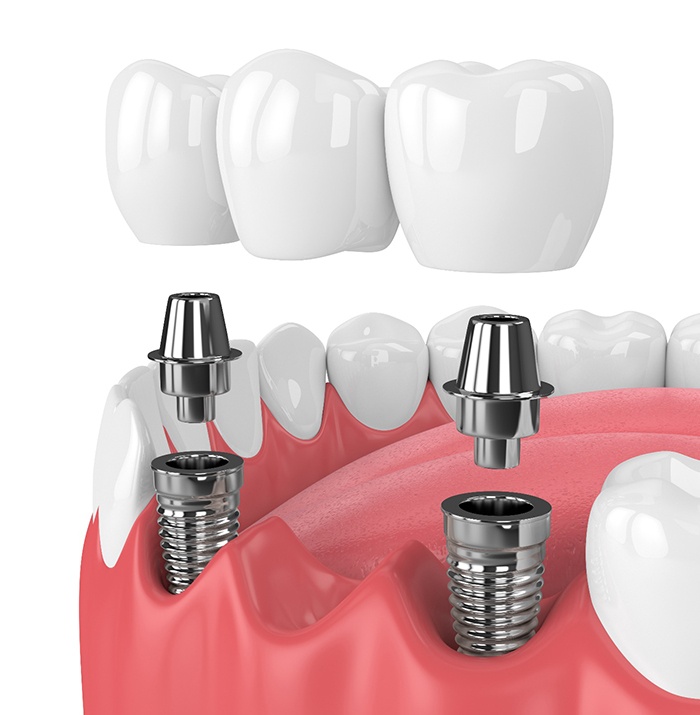
It generally takes two or three weeks to heal from the abutment surgery. After that, you’ll return to our office, where we’ll take impressions of your mouth to design your custom-made dental crown, bridge, or denture. The impressions are sent to a dental lab, where they will be personalized to mimic the pearly whites you were born with. Once your restoration has been placed, you can enjoy all of the benefits of a complete, healthy smile once again!
Benefits of Dental Implants

Dr. Byars and his team understand the many benefits of dental implants in Kansas City. This is why he will be happy to go over the numerous advantages you can expect should you choose to move forward with this type of restorative treatment. From improved oral health, greater jawbone stimulation, the ability to eat the foods you love, and a longer-lasting smile, it’s no wonder they’re viewed as the gold standard for tooth replacement. Check out some of the additional benefits below and contact us with any additional questions.
Day-to-Day Benefits

- Rooted in your jawbone, dental implants allow you to chew all of your favorite foods with ease.
- Dental implants in Kansas City look and feel completely natural, so others will never know you have them!
- Because they look and feel like your natural teeth, dental implants require the least amount of care compared to other options. Simply brush, floss, and see us for routine dental appointments to help them last for 30 years or more!
- Instead of being embarrassed by your dental implants, you will feel more confident in speaking and eating around others. You’ll also notice an improvement in how you pursue social gatherings instead of choosing to stay at home out of fear.
Health Benefits

- Healthy existing teeth will be untouched because dental implants replace the missing tooth and are anchored to the jawbone.
- Dental implants are the only tooth replacement solution that prevents the deterioration of your jawbone after tooth loss.
- You won’t need to worry about potential misalignment with dental implants because your regular teeth will remain firmly in place. By replacing your missing tooth, your other teeth will not shift and cause potential orthodontic issues in the future.
- You’ll enjoy greater overall health because of your new teeth. While tooth loss is known for being linked to diabetes, heart disease, and even osteoporosis, you can lower your risk by choosing permanent prosthetics.
Long-Term Benefits

- As long as you choose a qualified implant dentist in Kansas City to replace your missing tooth or teeth, you can expect your placement to have a success rate of about 95%. That same percentage can remain for up to 10 years if you are committed to taking proper care of your new smile.
- With proper care, dental implants can last a lifetime.
- Dentures and dental bridges often require special adhesives and cleaning supplies to maintain. However, dental implants do not, which will save you lots of money over time. Not to mention, you won’t need frequent adjustments or replacements.
Who Dental Implants Can Help

Once your dental implants are in place, we will fix a permanent restoration on top of them to complete your smile. The type of restoration that you need will depend on the number of teeth that you’re missing.
Missing Single Tooth
We can help patients missing one tooth restore the lost structure by attaching a dental crown to a single implant post. This implant-retained crown will seamlessly blend into your smile, restoring its beauty and function. Our dental crowns are custom-made to match the size, shape, and shade of your natural dental structure.
Missing Multiple Teeth
To replace two consecutive teeth, we’ll attach two connected crowns to a single implant post. Patients missing three or four consecutive teeth will likely need a series of connected dental crowns with an implant post at both ends of the restoration.
Missing All Teeth
Patients with more advanced tooth loss may want to consider supporting a partial or full denture with a number of dental implant posts. Partials are crafted to replace any number of missing teeth, both consecutive and nonconsecutive, by attaching the replacement teeth to a gum-colored base molded to fill the gaps. Full dentures are similarly crafted and restore an entire arch of missing teeth. We will anchor the prosthetic to the minimal number of dental implants that will still provide adequate support.
Learn More About Implant DenturesAll-On-4 Dental Implants
With All-On-4, a patient can literally have an entire row of teeth replaced in a single appointment. The procedure involves placing just four implants strategically along the jawbone and then immediately attaching them to a denture. Two are located towards the front where the jaw is naturally thicker, and another two are positioned at the back on each side at an angle. This approach allows many patients with bone loss to get implants without having to undergo a grafting procedure first.
Learn More About All-on-4Understanding the Cost of Dental Implants

The cost of your dental implants can greatly vary based on factors like your oral health, the number of teeth you’re missing, and the condition of your jawbone. That’s why it’s hard to give you a precise estimate without examining your mouth first. Additionally, it’s important to understand that the type of restoration that you need will also influence the total cost of your treatment. Dr. Byars, your expert implant dentist, will carefully examine your mouth to develop a personalized treatment plan that includes a price estimate. We also accept insurance and have financing options to provide everyone with the quality and affordable dentistry that they deserve.
Types of Dental Implants

It is important to understand that each patient’s mouth is unique. Therefore, every dental implant process is unique as well. There are many different types of dental implant treatments. For example, if you are missing just one tooth, you will need a single implant with a single crown. This will logically cost less than a multi-unit, implant-supported bridge. A full mouth reconstruction, which usually requires four or more implants, comes with an even higher price. Also, the specific techniques utilized to replace your teeth, as well as the materials used to create your final restoration, will have a bearing on the overall cost.
What Are the Stages of Dental Implant Treatment?
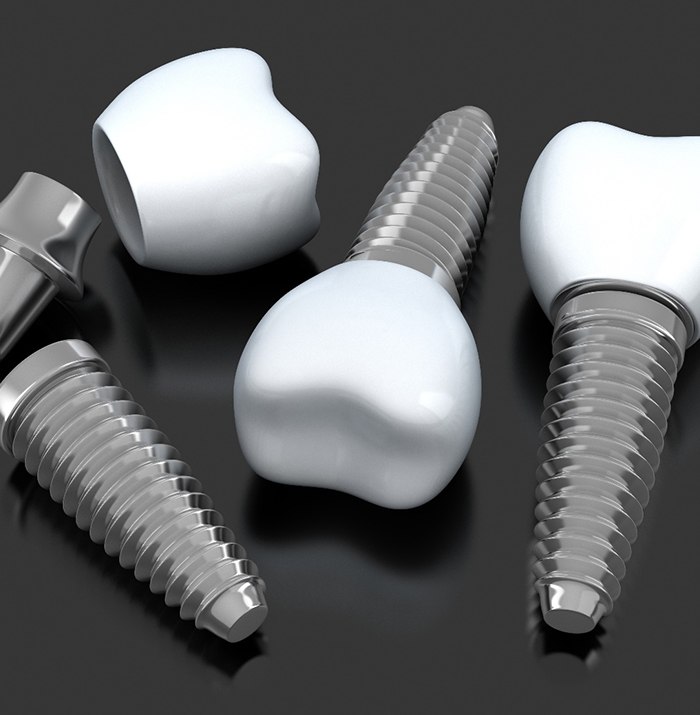
The dental implant process takes place across several steps, each of which has its own price. Some of the stages you may need to go through include:
- Preparatory treatment: Some patients require a bone graft or periodontal therapy before they are eligible to receive dental implants.
- Dental implant placement surgery: This is when the implants are inserted into the jawbone.
- Abutment placement: You might require a second minor surgery wherein a small connector piece will get attached to the tops of your implants.
- The final restoration: You will receive a crown, bridge, or denture to replace the visible portion of your lost teeth.
Are Dental Implants Worth the Investment?

Yes! Consider two main reasons why dental implants are worth every penny you might spend on them:
- They offer greater benefits than traditional tooth replacement: Dental implants function, feel, and look just like natural teeth. You might even forget that they’re there!
- They have the potential to last for a lifetime: Traditional dentures might last for five years or so, while a traditional bridge may last for 10 years. Dental implants, on the other hand, can last for decades. Thus, the long-term answer to the question, “What is the cost of dental implants?” may be a lower figure than the long-term cost of prosthetics that need to be replaced every so often.
Will My Dental Insurance Cover Dental Implants?

It’s hard to say. More and more dental insurance providers are offering coverage for implants, but many still do not. You will have to check the details of your specific policy. Even if it does not cover the implants themselves, it might pay for a portion of your preparatory treatment or your final restoration. Our team will be happy to help you figure out the details of how your insurance applies to your treatment. We can also help you apply for low-interest financing through CareCredit. Once you explore all the available financial resources, you may be surprised to learn that dental implants are more affordable than you thought!
Maintaining & Caring for Your Dental Implants

Did you know that dental implants have an impressive success rate of 90-95% even after ten years? However, that’s only the case if you take proper care of your new smile and protect it against damage and infection. At Byars Dental, we’ll explain everything you need to know to keep your implants firmly in place for a lifetime. If you’d like to learn more about how to maintain your newly rebuilt smile, continue reading or make an appointment with Dr. Byars today !
Make Oral Hygiene a Priority

Even though dental implants can’t get cavities, that doesn’t mean you can slack off on your oral hygiene. You’ll need to continue following a solid at-home dental care routine to prevent issues like gum disease from causing dental implant failure. Brushing at least twice a day, flossing daily, and rinsing with an ADA-approved mouthwash are a few ways you can keep your smile in optimal condition.
Eat a Healthy Diet

Since dental implants provide unmatched stability while chewing, you can eat almost anything with your new smile! However, you’ll want to avoid overindulging in hard, sugary, and starchy foods as they can be detrimental to your implants. Instead, you should stick to a diet full of nutrient-rich foods (i.e., fruits, vegetables, whole grains, lean proteins, dairy products). Not only are they great for your waistline, but they’ll improve your gum health as well. Plus, eating foods rich in calcium and vitamin C will allow your implants to stay in place for years to come.
Break Bad Habits

Poor habits like smoking, biting your fingernails, chewing on pens or pencils, using your teeth as tools, and eating ice are more harmful than you think. Not only can they destroy your tooth enamel, but your implants as well. Therefore, kicking these habits to the curb is the best thing you can do to protect your smile. You can keep some sugar-free gum in your pocket for times when you feel tempted to chew on a non-food item. And if you’re ready to quit tobacco, there are a multitude of resources available to make this feat as easy as possible.
Protect Your Dental Implants

Dental implants are certainly strong, but they’re not indestructible. If you regularly participate in sports or grind your teeth at night, you should ask Dr. Byars about a custom-made oral device. An athletic mouthguard can protect your implants against any damage while playing sports. Meanwhile, a nightguard is an excellent appliance for patients with bruxism (teeth grinding) as it can prevent serious damage to both the enamel and restorations.
Schedule Regular Dental Checkups

Aside from practicing good oral hygiene, it’s incredibly important to visit Dr. Byars every six months for a checkup and cleaning. Depending on your case, you might even be asked to come in more frequently. These preventive visits allow Dr. Byars to examine your dental implants to ensure there are no issues. By catching any underlying problems early on, you can avoid needing more extensive and costly procedures down the line.
Dental Implant FAQs

Dental implants have become one of the most popular tooth replacements for a number of reasons, but many have specific questions about them. Thankfully, Dr. Byars has put together a list of some frequently asked questions about dental implants in Kansas City. Keep reading to learn everything you need to know about them.
How Long Does the Dental Implant Process Take?
The process of receiving your dental implants can take from just a few months to over a year. Your dental implants need time to integrate into your jawbone, but this is exactly what makes them such a great long-term replacement. Your dental visits themselves won’t take very long, but most patients will have to wait between three and six months for their implants to completely fuse to their jaw.
Is the Dental Implant Process Painful?
Like many surgical procedures, the placement of your dental implants has the potential to cause discomfort. That’s why Dr. Byars and our team will numb your mouth as well as offer relaxing sedation to keep you comfortable. Your jawbone doesn’t actually contain any pain-sensing nerves, which makes the surgery a lot less painful than it sounds. The most discomfort patients feel will be after the process. You may experience bruising and soreness, but we’ll walk you through the best ways to keep yourself comfortable after your surgery is complete.
Am I a Good Candidate for Dental Implants?
The best way to know if you’re a candidate is to schedule an appointment with our expert implant dentist in Kansas City. Dr. Byars will evaluate your smile and oral health to see if dental implants are right for you. The ideal candidate will usually have a strong jawbone and a commitment to good oral healthcare. However, a definitive answer can only be obtained by visiting our practice for a dental implant consultation.
Who Should Consider Dental Implants?
If you’re missing any number of teeth, you should consider dental implants. They’re the only comprehensive tooth replacement available today, restoring not only the crown, but the tooth root as well. Dental implants can also be used to support dentures for a secure and stable smile. This restoration can bring the appearance, feel, and function back to your grin. Contact our office today to discuss the unique benefits that dental implants have to offer.
Dental Implants Post-Op Instructions
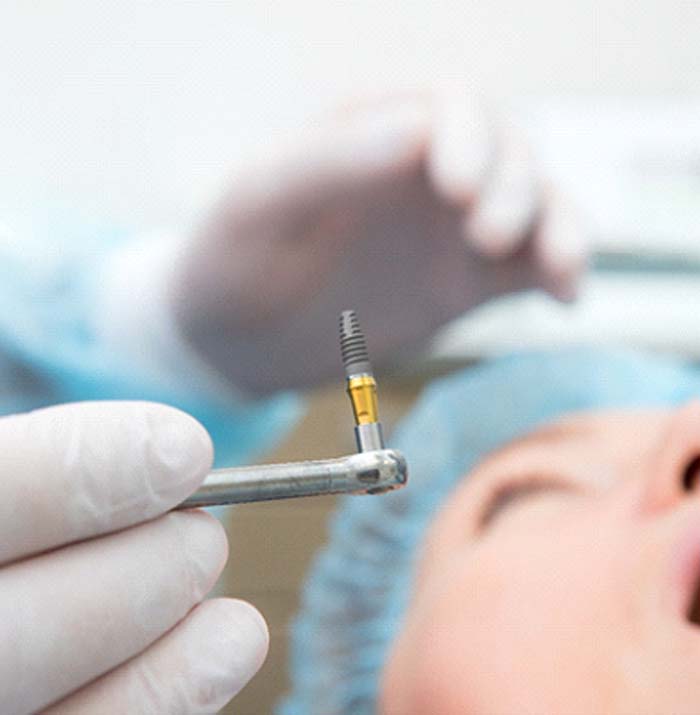
Following the placement portion of your treatment, you’ll need to take certain precautions to ensure your implants heal properly over the next several months. The good news is the most difficult part of healing only last a few days to a week at most, so once you clear that hurdle you’ll be on your way to a new smile that lasts for decades! While the tips below are the most important facts to know, you’re welcome to give us a call if you have questions or notice symptoms that aren’t mentioned.
What to Do Directly After Dental Implant Surgery

You’ll need to make sure the blood clot that’s begun healing over your treatment site does not become loose or fall off. If it does, it can lead to dry socket, a painful condition that can be easily prevented. Over the next 24 to 72 hours, make sure to avoid :
- Spitting (use tissue to catch any excess saliva or simply swallow it)
- Smoking or using tobacco products (especially after the first day)
- Using straws (which can loosen the blood clot)
- Touching the treatment site with your fingers or tongue
Common Side Effects

Keep in mind that some side effects are normal following implant placement (as well as other oral surgeries). These should begin to improve over the next several days. The most common side effects after dental implant surgery include:
- Minor Bleeding – This can be managed by applying light pressure to the treatment site with gauze pad.
- Swelling – Typically most notable over the first three days and managed with cold/warm compresses.
- General discomfort – We will write you a prescription for medication to alleviate discomfort as you heal. You’ll also be given antibiotics to prevent the risk of infection.
Diet

One of the worst things you can do for your dental implant is eat foods that put it at risk. This includes foods that are hot, spicy, crunchy, chewy, or tough. Instead, stick to foods that won’t disturb the stitches inside your mouth, such as:
- Mashed potatoes
- Scrambled eggs
- Cold/lukewarm soup
- Applesauce
- Smoothies (without the straw)
- Soft-cooked pasta
- Ice cream
- Pudding
You may return to a normal diet once you feel comfortable, but it’s best to avoid chewing on the treatment site until the stitches have been removed.
Health & Oral Hygiene

You may brush your teeth the day after your surgery, but you’ll need to use caution when working around the implant. Make sure to avoid brushing too hard or too quickly as this can disturb the area. Rinse your mouth out with either a saltwater mixture or a prescription mouth rinse from our office to keep the area clean. Do not use any mouthwashes that contain alcohol as these can lead to dry mouth.
What to Do After Your New Teeth Are Attached
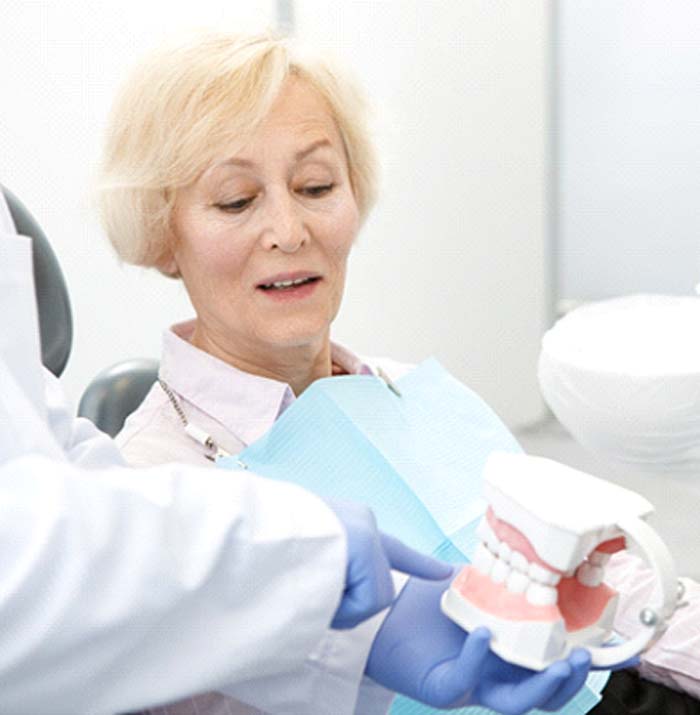
After about four to six months of healing and additional evaluations of your bone tissue via X-rays, we’ll confirm the implant has properly fused with your jawbone. Once it’s healed completely, you’ll come back to our office one last time to have your permanent crown, bridge, or denture attached.
I Need a Checkup & Cleaning I am Looking for a Dentist for My Child I am Concerned About Bleeding Gums I Have a Cavity or Broken Tooth I am Missing One or More Teeth I am Unhappy with My Smile I Want a Straighter Smile I am Scared of the Dentist I am in Pain & Need Help I am Concerned about Sleep Apnea Therapy View Our Services

